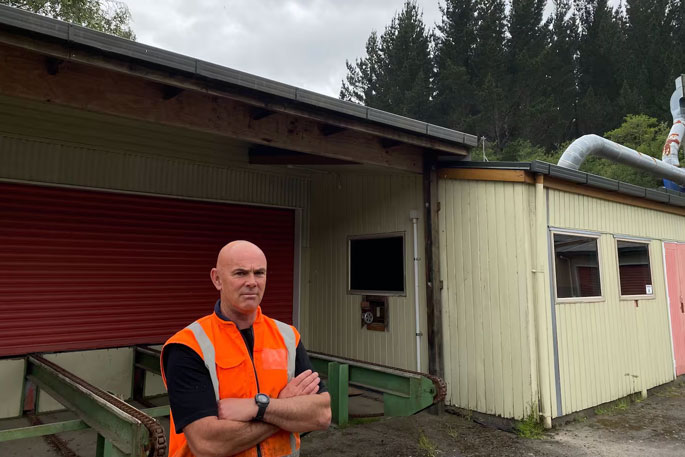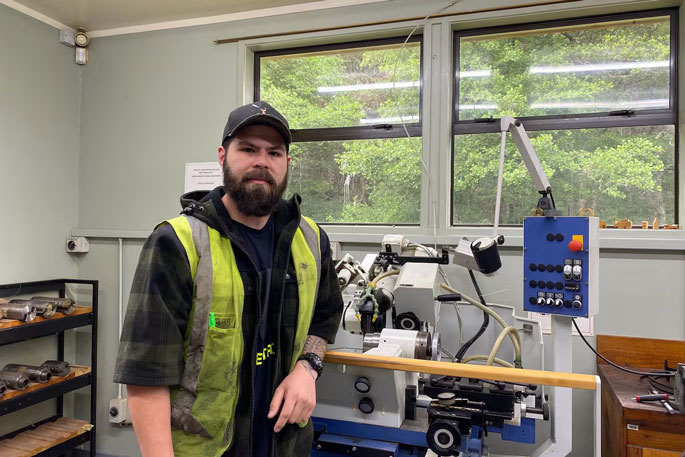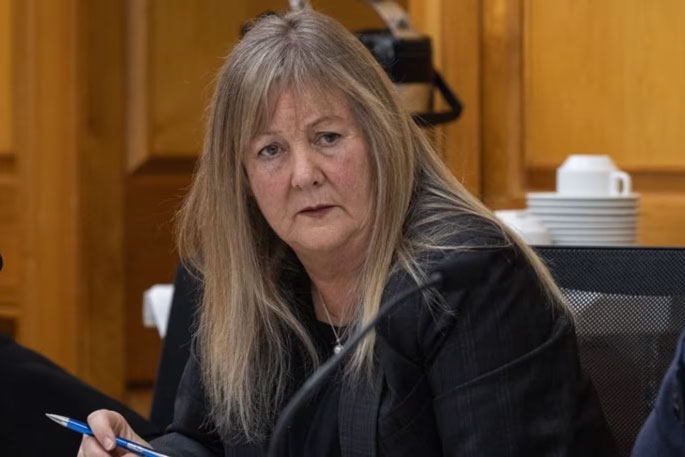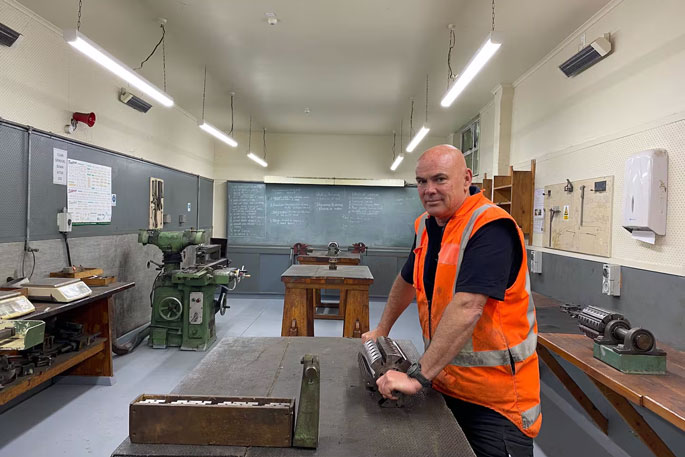A proposal to end an “invaluable” timber machining apprenticeship programme in Rotorua has left its tutor of 17 years worried for his students.
The proposal at the Bay of Plenty tertiary institution Toi Ohomai – if confirmed – would have up to 20 jobs lost and the end of “highly valued courses”, its union said.
A Te Hautū Kahurangi Tertiary Education Union statement on November 13 said courses at risk were across campuses in Taupō, Tokoroa, Rotorua, Tauranga and Whakatāne. They included forestry, timber machining, hairdressing, makeup and skincare, and social work.
The union slammed the proposed cuts and said it might result in the closure of the Waipā campus in Rotorua – a dedicated training facility that operates a working wood manufacturing plant.
Toi Ohomai said institutes of technology and polytechnics needed to become “financially viable” as the Government worked towards disestablishing Te Pūkenga and forming a new vocational education structure.
The proposal was in the consultation phase and “no decisions have been made”.
‘We won’t have quality timber machinists’
Waipā campus senior academic staff member in forestry and wood manufacturing Kerry Parker told the Rotorua Daily Post his role would be disestablished under the proposal and the New Zealand Certificate in Timber Machining (Level 4) apprenticeship programme would be discontinued.
 Kerry Parker: "If it closes there will be no timber machining or saw doctoring block courses left in Aotearoa.” Photo / Megan Wilson
Kerry Parker: "If it closes there will be no timber machining or saw doctoring block courses left in Aotearoa.” Photo / Megan Wilson
The tutor of 17 and a half years found out on October 24 and reacted “very negatively”.
Parker was not worried for himself because he was an “employable” person, but feared for his students, some of who had called him “in tears” after learning of the proposal.
He said the campus was “invaluable” and the forestry industry was “one of the biggest employers” in the Rotorua area.
“Without this course, I feel we won’t have quality timber machinists to work in industry.”
Parker said his graduates became site managers, supervisors, and head machinists.
“Even if I’m not here, I want this place going because it’s so important to industry.”
In the union press release, Parker said the Waipā campus was “the only facility of its kind in the Southern Hemisphere”.
“If it closes there will be no timber machining or saw doctoring block courses left in Aotearoa.”
‘Really sad’ for students
Hartley Archibald, 29, is in the final year of his apprenticeship at Waipā campus.
Archibald, who works at North Sawn in Ruakākā, said he would be “fully qualified” after graduating.
“It’s really good coming to the course and actually being able to practise on all the machines and equipment ...
 Waipā campus student Hartley Archibald. Photo / Megan Wilson
Waipā campus student Hartley Archibald. Photo / Megan Wilson
“When you’re at the factory on production, you don’t get the time to practise anything because you’re producing all the timber ... ”
Archibald said the proposal was “really sad”, especially for students who had just started their training.
‘Having trained staff is crucial’
Hume Pine manager Craig Peters spoke of the “vital role” the Waipā campus had in training timber machinists.
Peters said Hume Pine had regularly sent staff to gain qualifications in timber machining in his 13 years as manager, “with the majority using the learned skills to advance their careers”.
Peters said machinists had progressed to operations manager, production manager and technical machinist.
“Without the ability to machine timber, we become more reliant on importing and face the real possibility of job losses.
“If we are to continue manufacturing in New Zealand, having trained staff is crucial.”
‘Working towards financial sustainability’
In a joint statement, Toi Ohomai tumu whenua (executive directors) Kieran Hewitson and Huia Haeata said as the Government worked towards disestablishing Te Pūkenga and forming a new vocational education structure, expectations were for institutes of technology and polytechnics (ITPs) to become “financially viable”.
It said the Government had called for fiscal restraint across all sectors as the economy experienced high inflation.
“International enrolments have not recovered to pre-Covid levels and over the past two years, domestic enrolments have fallen.”
It said revenue restraints meant the vocational education and training sector had been experiencing financial challenges for “some time”.
“It is essential that institutions are both financially sustainable and can support the needs of their region, whether they are stand-alone, autonomous entities or part of a broader network or federation.
“Toi Ohomai, alongside many others, are working towards financial sustainability.”
The statement said Toi Ohomai was consulting with kaimahi (staff) on multiple change proposals as it worked towards this goal.
“No decisions have been made.”
It said some affected kaimahi received personal letters regarding the proposals. Those who could be significantly affected had individual hui.
“Given the economic environment we find ourselves in, difficult choices will need to be made for the sector and for individual ITPs including reducing property footprints, decreasing programmes and, as a result, reductions in staff numbers.”
It said Toi Ohomai was committed to supporting kaimahi as it worked through the process and was focused on their wellbeing.
“It is important to note that this is a consultation and we genuinely want to gather and understand feedback from our people before making any decisions and engaging wider with stakeholders and our communities.
“Despite constant change within the tertiary education sector, Toi Ohomai remains committed to delivering high-quality education and training to its ākonga [students].”
Consultation on most of the proposals closes on November 28. Decisions are expected to be made about mid-December.
Toi Ohomai was asked how many staff were at risk of losing their jobs, how many students would be affected, the number of courses at risk, and if the Waipā campus was at risk of closure.
Minister Simmonds responds
Minister for Tertiary Education and Skills Penny Simmonds said she was not privy to information regarding the operational decisions that Toi Ohomai or any other polytechnic might contemplate.
Simmonds said it was important for Toi Ohomai and all polytechnics “to be taking appropriate actions to ensure their overall viability”.
 Minister for Tertiary Education and Skills Penny Simmonds: “I recognise that the months ahead will be a challenging time." Photo / Phil Smith
Minister for Tertiary Education and Skills Penny Simmonds: “I recognise that the months ahead will be a challenging time." Photo / Phil Smith
Simmonds said the Government had requested the Tertiary Education Commission work with Te Pūkenga to assist all polytechnics to review their operations – “an exercise that should have happened four years ago when Te Pūkenga was set up to ensure the viability of the polytechnic sector”.
“I recognise that the months ahead will be a challenging time. There will be some difficult decisions that need to be made to address the issues that are impacting the sustainability of our vocational education and training system.
“I want to acknowledge the many staff in both industry training organisations and polytechnics who have endured uncertainty for many years and thank them for their ongoing commitment to our vocational education and training sector.”



1 comment
Hmmm
Posted on 25-11-2024 14:29 | By Let's get real
Take a step back and ask, if industry wanted qualified staff, wouldn't the course be financially viable and therefore remain open..?
Have the employers been approached to sponsor the course... presumably not, or if they have, they don't see the value of retaining it.
There's nothing wrong with closing courses that are becoming increasingly redundant due to improving technology and advanced methods of working.
Leave a Comment
You must be logged in to make a comment.